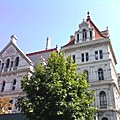- By -Staff
- Business & Technology
 Print
Print  Local sales tax collections in New York state grew by $177 million, or 2.4 percent, for the first half of 2014 compared to the same period in 2013, according to a report issued today by State Comptroller Thomas P. DiNapoli. In Tompkins County sales tax revenue rose by 4%, from $22,971,66 in the first half of 2013 to $32,896,811 this year. Nineteen counties experienced an increase of more than 4 percent during this period.
Local sales tax collections in New York state grew by $177 million, or 2.4 percent, for the first half of 2014 compared to the same period in 2013, according to a report issued today by State Comptroller Thomas P. DiNapoli. In Tompkins County sales tax revenue rose by 4%, from $22,971,66 in the first half of 2013 to $32,896,811 this year. Nineteen counties experienced an increase of more than 4 percent during this period.“While sales tax revenues continue to increase across the state, the growth is the weakest since the end of the Great Recession,” said DiNapoli. “Sales tax collections in New York City are thriving but several regions are experiencing only modest gains or even declines. Clearly our state’s economy remains in a recovery mode and local government officials will need to be mindful of the volatility of sales tax revenue as they monitor their budgets during the second half of the year.”
DiNapoli’s analysis found that year-over-year growth in sales tax collections was 1.2 percent in the first quarter of 2014. Growth in the second quarter of the year was slightly stronger at 3.5 percent.
The gains were driven primarily by New York City with collections growing by 4.8 percent, or $152 million. This accounted for nearly 90 percent of local sales tax growth in the state during the first half of 2014.
By comparison, Long Island’s sales tax collections fell 3.8 percent, or $45 million, during the first two quarters of the year compared to 2013. However, most of the decreases are likely the result of spending patterns returning to normal after an increase in collections in 2013 that were fueled by continued cleanup and rebuilding efforts following Superstorm Sandy.
Upstate sales tax collections, meanwhile, were nearly flat in many regions. The capital district (3.5 percent) and mid-Hudson Valley (2.4 percent) outpaced western New York (1.7 percent), central New York (1.5 percent) and the Finger Lakes (0.9 percent) during the first half of the year.
Due to a number of tax rate increases, growth in sales tax revenue for the North Country (7.6 percent) topped all regions of the state, including New York City.
At the county level, St. Lawrence County (31 percent), Hamilton County (24.4 percent) and Lewis County (15.6 percent) experienced the most growth. Other counties that fared well include: Essex County (9.3 percent); Dutchess County (7 percent); Franklin County (6.4 percent) and Rockland County (6.4 percent).
Nassau County (-8.3 percent), Ulster County (-5.7 percent) and Broome County (-5.6 percent) all experienced notable declines in sales tax revenue.
v10i29




